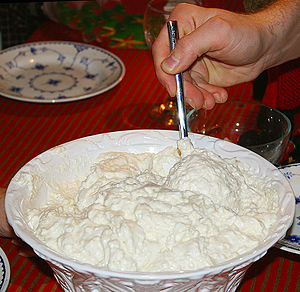I eat a lot of rice – white, brown, sweet, wild, steamed, fried, with Spam, and with kimchee. It’s “just” rice, rice cakes, rice noodles, rice crackers, rice porridge. When I buy rice it is not in a box. It is in a 20# bag, which I empty into my rice dispenser. The rice cooker (mine plays a song) takes up precious countertop, right next to the toaster oven and the coffee grinder. I have spoons for serving rice.
But until Sunday I had never had rice pudding, and I didn’t know you could eat it with lingonberries. The occasion was my church’s 35th anniversary. My family has been there for at least 5 of those years. The festive, celebratory mood was obvious, and knowing that my church has been such a key place for so many throughout the years continues to give me hope that I too will feel a deeper sense of belonging in the years to come.
But I get impatient, and I get cranky. And I wonder if it’s OK that Sunday is the most segregated day of the week for Christians because on Sunday I really felt like the best I could do was eat and leave. I had to ask what “that dish” was, which I learned was rice pudding. I recognized the salmon and the ham & rolls. Thanks to my mom’s days at Motorola I recognized versions of broccoli salad and jello salad. And thanks to Ikea my boys and I recognized the meatballs and lingonberry as well as the blue and yellow. I felt like a guest at my own church.
I’ve been told by others that I am not alone, and that it takes time. But when you are in the moment(s), time is not what I want to give.
It was a homecoming for many, but it was another cross-cultural adventure for me. I felt so outside inside of my own church, and I am still wrestling with how I as a regular attender can engage well when on most Sundays my family and I stand out. Our traditions are not part of the present or the past, and we are still trying to find our way to places to impact the present and future. I don’t want to get rid of the rice pudding or meatballs, but I really do think potstickers and seaweed would go well with the salmon.
Because it is in the breaking of bread (or breaking out the rice in its many versions) and in the act of fellowship amongst sisters and brothers in faith we should find that the differences matter because there is space to delight in the variety, creativity and abundance that is from God. Look around. God doesn’t paint all the leaves one shade yellow. Our differences don’t define us; our Creator does.
But that’s easy to say when no one is there to point out the differences and say “we celebrate God’s goodness this way, with this food, with these people”. At the last church we were a part of, we wrestled with the same issue. The church was started specifically for second-generation Korean American youth who were growing up in immigrant, Korean-speaking churches. (And if that doesn’t make any sense to you, please ask for a longer explanation because I would welcome that.) The youth grew up, got married to Koreans and non-Koreans. We had children. We celebrated milestones with kimbap, Korean-style wings, jjap-chae, and dduk. And we assumed everyone would know what it all was and would enjoy it because that is how we all celebrate. And we were wrong.
And so I take a deep breath and discover that rice pudding is OK (better with the lingonberries) though I prefer rice cakes or the meatballs. Because the idea of creating an inviting and welcoming space isn’t limited to Sundays and a church.
